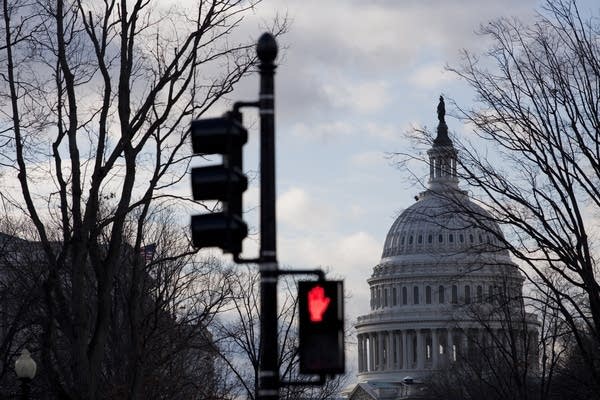After the cliff: Not much change right away

As White House and congressional negotiators lurch toward a fiscal deadline Tuesday, one fact has become clear:
If Democrats and Republicans fail to reach a tax and spending compromise before Tuesday, not a lot is going to change for most people, at least not right away.
"You would think it"s Armageddon; it is the apocalypse; it is the end of the world," said Marketplace economics editor Chris Farrell. But it's not, he said.
"There will be no difference between Dec. 31 and Jan. 1 of the new year if there is no agreement."
Create a More Connected Minnesota
MPR News is your trusted resource for the news you need. With your support, MPR News brings accessible, courageous journalism and authentic conversation to everyone - free of paywalls and barriers. Your gift makes a difference.
Brian Kessler, an economist at Moody"s Analytics, agreed with Farrell.
"The difference between Dec. 31 and Jan. 1 is going to be imperceptible both in terms of individual people's experience and the greater economy, and it's going to be a while until we start to really a major impact," Kessler said.
To be sure, going over the fiscal cliff will present millions of people with immediate problems, not the least of whom are an estimated 12,000 Minnesotans who would stop getting federal unemployment checks.
There is a long list of potential tax increases and spending cuts. But with so much uncertainty about what lawmakers will do, Farrell said, the people who actually sign paychecks will stick with the tax status quo, at least initially.
"They're going to actually, perhaps for the first month, use 2012," Farrell said, "because they haven't gotten the new guidance for 2013 from the IRS. So it might even be February before it really kicks in."

Farrell said that while much is unknown about what an eventual deal might look like, it is clear the so-called payroll tax holiday will not be part of any long-term budget fix. Congress enacted the payroll tax cut in 2010 to stimulate the economy. It has meant an extra $20 a week for people who earn the median income of $50,000 a year.
Kessler said he and his colleagues have expected for months that Washington would miss the fiscal cliff deadline and that going over the cliff might be necessary to motivate Democrats and Republicans to come to a tax and spending agreement.
How long the economy can stay on the track it's on without a deal is the question, Kessler said.
"We don't know when people are going to start to go, 'Holy cow, they're really not coming to a deal on this and we ought to start changing our consumption and investment decisions,' and the impact starts to get real severe," he said. "And that could start small and speed up very quickly."
Kessler and Farrell agreed that the real deadline for getting something done is probably somewhere closer to a month away.
"It's not a fixed date, but I would say if it doesn't look real solid by the middle of February perhaps that would be a good time to start panicking," Kessler said.
Although there is a lot of uncertainty about what will happen over the next several weeks, there is no question the protracted budget battle has hindered the weak recovery for no good reason.
"We've actually depressed growth," Kessler said. "We've almost certainly increased or prolonged high unemployment and we are harming the economy right now as we speak."
Farrell said, "It's eating away at some hiring. It's eating away at some household buying, but it's not knocking us into recession."
At least not yet.
